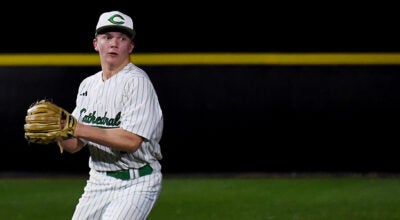Referees know they’re the most hated
Published 12:40 am Sunday, March 18, 2012
Fuqua also hears all the complaints.
In disputes between officials and coaches, Fuqua listens to both sides of the argument. Then he sits down with the official to make sure that he is doing things correctly and if not he suggests ways to improve, he said.
Fuqua said sometimes the problem arises when an official does not feel comfortable with a certain coach or environment, and he tries to solve that problem through scheduling.
“I try not to send a guy that tells me, ‘I don’t want to go back to this place,’” he said. “I try to honor that. I’m not going to send somebody somewhere I know there will be a problem.”
Fuqua said the biggest lesson for new officials is dealing with hostile crowds.
“You have to put up with the fans hollering,” he said. “You hear a lot of stuff, and a lot of people let that bother them. But as you grow older and do it a long time you learn to deal with it and deal with coaches. It took me five or six years on the varsity level before I really felt comfortable on the floor, but it doesn’t bother me now.”
Any problem with an MAIS official that Fuqua, or any other assignment secretary, cannot handle gets sent up to the state level and is handled by MAIS.
MAIS Director of Activities Les Triplett said if an issue gets past the assignment secretaries then his staff will review the game film to determine what actions need to be taken.
But Triplett said the overall review of the MAIS officials is positive from his perspective.
“We always want to get better,” Triplett said. “It will never be good enough for me or the coaches, but I think we have a group of dedicated guys that get out there. Overall I’m happy with what we have in most areas of the state with an adequate number of officials. Some areas are lacking and officials are doing three or four games a night, and that’s not good.”
Fuqua and Triplett both said the MAIS is always looking for new officials, and Triplett said the MAIS makes sure each official is trained to handle the level of competition they will referee.
Triplett said there are a variety of training opportunities for younger referees including preliminary meetings, training sessions, rules clinics and jamborees.
Triplett said the MAIS starts referees out on the junior high level, and it always helps if the new official has refereed church or recreational league games before, but it is not mandatory.
“We gradually work them into the system and in two to three years they are ready to call varsity,” Triplett said.
Triplett said if a new official has no previous experience then they will have individual teaching sessions with that official to get them started.
A 100-question standardized test is used nationally to determine where each official is to start the season.
“We don’t have a set score but what we do is identify pretty quickly if somebody gets the test and has a struggling grade,” he said. “We prefer at least an 80 to 85, but we’re not going to black ball anybody. If they show enough interest we will work with them and help them learn enough to eventually become and official.”
Triplett said postseason officials are chosen by the MAIS from a field of officials that is narrowed down through a variety of reviews.
The assignment secretaries from each district recommend their top officials and MAIS also gets reviews of individual officials from coaches.
Triplett said the MAIS uses the same process to pick officials for all of its sports.




